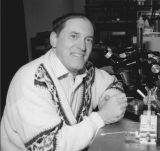|
||||||||||||||||||||||||||||||||||||||||

Stephen A. Lyon
|
Stephen A. LyonProfessor of Electrical EngineeringPh.D. 1978, California Institute of Technology
The tremendous progress by process engineers, semiconductor device physicists, and circuit designers in making better chips is the foundation upon which the computer revolution of the last decades has been built. The complexity of chips has been doubling every eighteen months, and their speed has been increasing by a factor of ten every five years. A key ingredient in this progress has been a deeper understanding of the physics of the materials and devices. The goal of my research is to advance the physical foundations of semiconductor devices and develop new kinds of devices. In one project we are studying ultrafast processes and nonequilibrium transport in semiconductors. As the clock speeds increase, the electrons in suitably designed devices may be able to travel with little or no scattering. The usual concept of resistivity breaks down in this regime. We have fabricated special devices in which this "ballistic transport" can be observed and studied. We have made structures in which the intrinsic speed of the electron is about ten times larger than one sees under normal circumstances. We are also developing ultrafast laser techniques to study similar phenomena in other structures. As devices are made smaller, quantum effects will become important. Within about ten years these effects may influence the operation of commercial devices. We are investigating new device designs, which will take advantage of quantum mechanical processes to provide a route to further device scaling and performance improvements. We are using time-resolved optical experiments and terahertz spectroscopy to study electron interference in new device structures. Another aspect of this work concerns the study of "quantum dots" --a few hundred or thousand molecules of one material embedded in another. These structures exhibit a range of potentially useful properties, from new kinds of semiconductor lasers to ultrasmall devices. In particular, we are investigating ways of utilizing quantum dots for quantum computing. While quantum computation theoretically provides revolutionary advances, the physical realization will be exceptionally challenging. The combination of nanofabrication and quantum dot physics is one of the more promising approaches to making a scalable quantum computer. |
|||||||||||||||||||||||||||||||||||||||